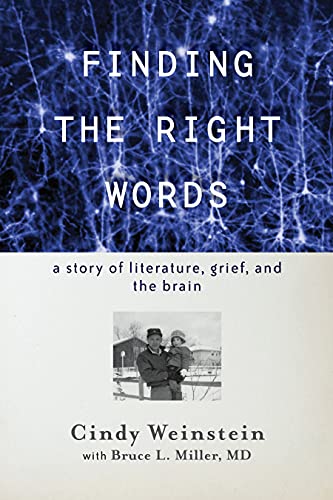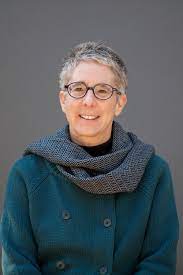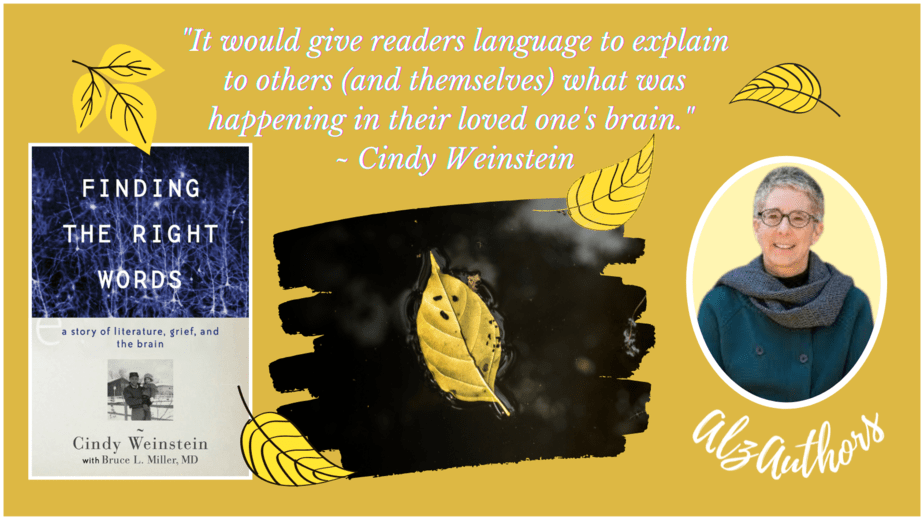By Cindy Weinstein
 I wrote Finding the Right Words: A Story of Literature, Grief, and the Brain because I had to. My father was diagnosed with Alzheimer’s while he was in his late 50’s. I was 25. Since then I learned that because my father was not yet 65, he suffered from early-onset Alzheimer’s. His earliest symptom was difficulty with word-finding. I was getting my Ph.D. in English and becoming an expert with words. Since then, I learned that the variant he had was the logopenic variant. When this awful synchronicity was happening, my devastation took the form of throwing myself into my work, seeing what my father was enduring but not fully taking it in, and deferring the guilt that would eventually take over my waking hours once he died.
I wrote Finding the Right Words: A Story of Literature, Grief, and the Brain because I had to. My father was diagnosed with Alzheimer’s while he was in his late 50’s. I was 25. Since then I learned that because my father was not yet 65, he suffered from early-onset Alzheimer’s. His earliest symptom was difficulty with word-finding. I was getting my Ph.D. in English and becoming an expert with words. Since then, I learned that the variant he had was the logopenic variant. When this awful synchronicity was happening, my devastation took the form of throwing myself into my work, seeing what my father was enduring but not fully taking it in, and deferring the guilt that would eventually take over my waking hours once he died.
Dr. Bruce Miller, with whom I wrote the book, gave me the gift – devastating though it was – of a precise diagnosis. His empathy and knowledge allowed me to share the story of my father’s early-onset Alzheimer’s with the logopenic variant and enabled me to write a story that made sense of my grief (if sense could be made out of it). I also wanted to write about how literature helped me through the sadness and how neurology might have. This last point is why I studied neurology for a year at the University of California San Francisco and asked Bruce, head of the Memory and Aging Center there and expert in dementia, to write Finding the Right Words with me. My goal was to write a book that told the individual story of my father, his illness me, a girl from New Jersey who loved literature, and also told a general story about people with dementia, their brains, and their caregivers. This would help people. Telling stories of my mother being stigmatized because people treated my father as if his illness were contagious would help others. It would give readers language to explain to others (and to themselves) what was happening in their loved one’s brain. Not everyone can go to UCSF to get a team of experts to provide a diagnosis and follow-up caregiving plan, and I wanted readers to have access to that knowledge, support, and empathy, all of which are essential for families to have.
The death of my father didn’t end my grief; in fact, it took years, indeed decades, to confront the emotional wreckage that my family – but especially of course my father – endured. In studying neurology and writing the book, I looked and confronted my father’s illness in a way I was unable to at the time. And then I could remember and get back to the time before he was sick. That time had been almost wiped out in my own brain and it was only by remembering the pain (his and mine) that I was able to remember my whole father and the moments of pure delight I was so lucky to have had.

Bio
Cindy Weinstein grew up in Verona, New Jersey, went to Brandeis University for college, and then UC Berkeley for a Ph.D. in English. She has been a professor of English at the California Institute of Technology, where she currently holds the Eli and Edythe Broad Professor of English. At Caltech, she has had the great fortune to teach American literature to brilliant students, and to write several books along the way, including her most recent one, written with Dr. Bruce Miller, about her father’s early-onset Alzheimer’s. She is married and has two children. When she is not walking her dog or writing in a café that serves very strong coffee, she is probably in a bookstore looking for her next book to read or rereading Moby-Dick.
Connect with Cindy:
Amazon.com: Cindy Weinstein: Books, Biography, Blog, Audiobooks, Kindle
Finding the Right Words – Cindy Weinstein & Dr. Bruce Miller (weinsteinandmiller.com)



One Response
This looks really interesting and I’m sure will be helpful. Thank you for sharing this.
Robin